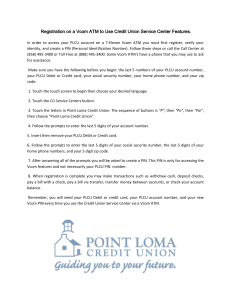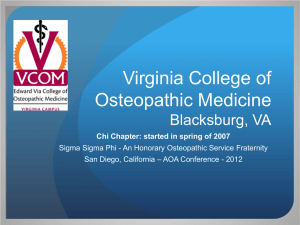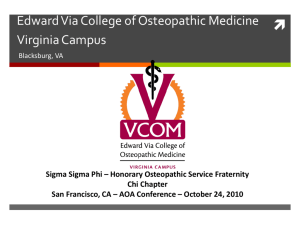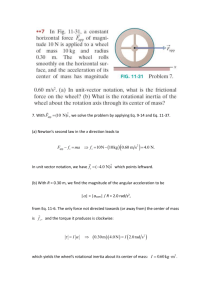What is Visual Communication Design?
advertisement
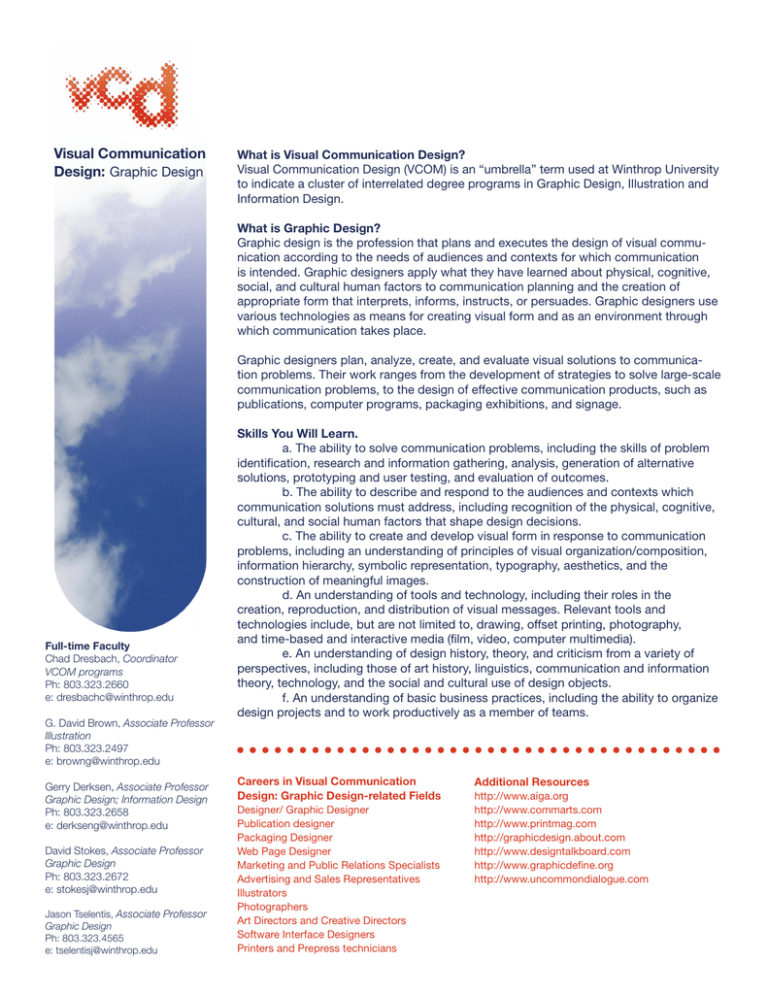
Visual Communication Design: Graphic Design What is Visual Communication Design? Visual Communication Design (VCOM) is an “umbrella” term used at Winthrop University to indicate a cluster of interrelated degree programs in Graphic Design, Illustration and Information Design. What is Graphic Design? Graphic design is the profession that plans and executes the design of visual communication according to the needs of audiences and contexts for which communication is intended. Graphic designers apply what they have learned about physical, cognitive, social, and cultural human factors to communication planning and the creation of appropriate form that interprets, informs, instructs, or persuades. Graphic designers use various technologies as means for creating visual form and as an environment through which communication takes place. Graphic designers plan, analyze, create, and evaluate visual solutions to communication problems. Their work ranges from the development of strategies to solve large-scale communication problems, to the design of effective communication products, such as publications, computer programs, packaging exhibitions, and signage. Full-time Faculty Chad Dresbach, Coordinator VCOM programs Ph: 803.323.2660 e: dresbachc@winthrop.edu G. David Brown, Associate Professor Illustration Ph: 803.323.2497 e: browng@winthrop.edu Gerry Derksen, Associate Professor Graphic Design; Information Design Ph: 803.323.2658 e: derkseng@winthrop.edu David Stokes, Associate Professor Graphic Design Ph: 803.323.2672 e: stokesj@winthrop.edu Jason Tselentis, Associate Professor Graphic Design Ph: 803.323.4565 e: tselentisj@winthrop.edu Skills You Will Learn. a. The ability to solve communication problems, including the skills of problem identification, research and information gathering, analysis, generation of alternative solutions, prototyping and user testing, and evaluation of outcomes. b. The ability to describe and respond to the audiences and contexts which communication solutions must address, including recognition of the physical, cognitive, cultural, and social human factors that shape design decisions. c. The ability to create and develop visual form in response to communication problems, including an understanding of principles of visual organization/composition, information hierarchy, symbolic representation, typography, aesthetics, and the construction of meaningful images. d. An understanding of tools and technology, including their roles in the creation, reproduction, and distribution of visual messages. Relevant tools and technologies include, but are not limited to, drawing, offset printing, photography, and time-based and interactive media (film, video, computer multimedia). e. An understanding of design history, theory, and criticism from a variety of perspectives, including those of art history, linguistics, communication and information theory, technology, and the social and cultural use of design objects. f. An understanding of basic business practices, including the ability to organize design projects and to work productively as a member of teams. Careers in Visual Communication Design: Graphic Design-related Fields Designer/ Graphic Designer Publication designer Packaging Designer Web Page Designer Marketing and Public Relations Specialists Advertising and Sales Representatives Illustrators Photographers Art Directors and Creative Directors Software Interface Designers Printers and Prepress technicians Additional Resources http://www.aiga.org http://www.commarts.com http://www.printmag.com http://graphicdesign.about.com http://www.designtalkboard.com http://www.graphicdefine.org http://www.uncommondialogue.com GRAPHIC DESIGN; 12-13 DEGREE CHECKLIST Name SID e•mail Department of Design Bachelor of Fine Arts in Visual Communication Design - Graphic Design track 124 Semester Hours Recommended Course Sequence Fall Semester Cr. Hrs. 1st Year VCOM 101 VCOM Seminar 1___ VCOM 120 Design Drawing (117x) 3___ VCOM 150 Design Studio Skills 3___ VCOM 151 Design Fundamentals 3___ CSCI 101 Intro. CSCI (w/ a, f, i ) 4 3___ WRIT 101 Composition 3___ ACAD 101 Prin. of Learning Acad. 1___ Total 17 2nd Year VCOM 222 Vis. Think/Symb. Comm. 3___ VCOM 259 Intro. Graphic Design 3___ VCOM 262 Intro. to Web Design 3___ ARTH 176 Art History II 3___ CRTW 201 Critical Reading, Writ. 3___ VCOM 300 Specialization Review 3 0___ Total 15 3rd Year VCOM 355 Design Concepts 3___ VCOM 358 Intermediate Type 3___ __________ ARTH elective 3___ __________ Social Science req. 1, 2 3___ __________ Natural Science req. 1 3___ Total 15 4th Year VCOM 486 Sr. Thesis Proposal 2___ VCOM ____ directed elective 3___ __________ Natural (lab) Science req. 1 4___ ECON 103/ Intro. Political Economy -or PLSC 201 American Government 3___ __________ elective 3___ Total 15 ladder Spring Semester VCOM 154 VCOM 258 VCOM 261 ARTH 175 HMXP 102 Cr. Hrs. Design and Color Intro. Typography Intro. Computer Imaging Art History I Human Experience 3___ 3___ 3___ 3___ 3___ Total 15 VCOM 301 VCD Critical Seminar I 1___ VCOM 363 Multimedia Design I 3___ VCOM 374 Hist. GD/Illustration 3___ VCOM 388 GA Prod. Practices 3___ MCOM 341 Advertising Principles 3___ MATH 150 Intro. Discrete Math 3___ Total 16 VCOM 401 VCD Critical Seminar II 1___ VCOM 340 Co-op/ Internship 3___ VCOM 453 Corporate Identity 3___ VCOM 455 3DGD 3___ WRIT 465 Prep. of Oral & Written... 3___ BADM 180/ Contemp. Business Iss. -orFINC 101 Personal Finance 3___ Total 16 VCOM 501 VCD Critical Seminar III 1___ VCOM 487 Sr. Thesis 2___ VCOM 578 Professional Portfolio 3___ VCOM ____ directed elective 3___ __________ Humanities req. 1 3___ __________ elective 3___ Total 15 VCOM courses numbered over VCOM 300 are only offered once per year (courses in Bold), and in the semester indicated. Since many VCOM classes listed are prerequisites for subsequent classes, students are strongly encouraged to take them in the order presented. Deviation from the recommended course sequence of program classes could result in delayed matriculation. Notes: 1 = “General Education” university requirement. See list of approved classes in Winthrop’s catalog, website, or scheduling bulletin. 2 = designator must not duplicate PLSC 201 or ECON 103 3 = Requirements for review: completion or in progress all of VCOM 120, VCOM 150, VCOM 151, VCOM 154, VCOM 222, VCOM 258, VCOM 259, VCOM 261and VCOM 262 with final grade of C+ in each VCOM class. The review is offered 3x per year and passage of the review is required of all VCOM studio classes numbered over VCOM 300. 4 = the CSCI sequence will be dropped from the degree after AY12-13; students should select another required course in the degree program, ideally one which meets Touchstone requirements.
